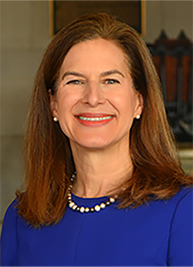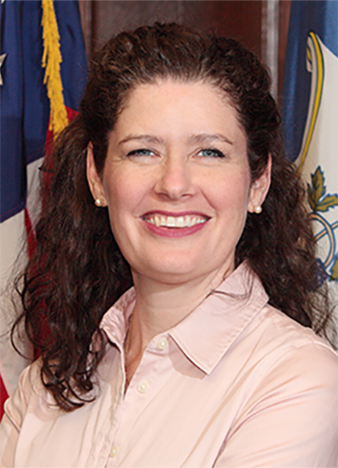SAVE THE DATE
Connecticut Association of Conservation & Inland Wetlands Commissions
42nd Annual Meeting & Environmental Conference
Held Saturday, November 23, 2019

Lt. Governor Susan Bysiewicz
Biography
|
2019 CACIWC Keynote Presentation
Preserving Connecticut Habitats for Earth Day 50 and Beyond
Connecticut Lt Governor Susan Bysiewicz and CT Department of Energy and Environmental Protection (DEEP) Commissioner Katie Dykes served as our 2019 conference keynote speakers.
Our two keynote speakers will help CACIWC begin Connecticut's celebration of the upcoming 50th Anniversary of Earth Day with their presentations, which will focus on our 2019 conference theme, Preserving Connecticut Habitats for Earth Day 50 and Beyond. They will review the progress made throughout Connecticut in conservation and environmental protection during the past 50 years while reviewing areas that still need our attention.
  
Thank you to our Corporate Sponsors
|

CT DEEP Commissioner Katie Dykes
Biography
|
CONFERENCE DESCRIPTION
|
Our 2019 Annual Meeting & Environmental Conference will include four revised and updated workshop tracks with topics on preserving our forests and their inhabitants, preserving our wetlands and watercourses, preserving our water bodies and aquatic systems, and preserving & sustaining our habitats. Individual workshops will focus on emerging insect pests, reviewing complex applications, water quality and streamflow standards, updates on recycling in Connecticut, natural forest ecosystems for climate change, wetlands law & regulation updates, best management practices for stream crossings, sustainable program initiatives, coexisting with wildlife, working with other agencies, calculating sea level rise impacts and reading maps & flooding impacts.
Our conference venue will also host a revised layout of new and informative displays in an arrangement that will promote open discussions and networking opportunities among our members and other conference attendees. Please note that our CACIWC’s 42th Annual Meeting & Environmental Conference will again start 30 minutes earlier this year to accommodate our new keynote speaker plenary session. Be certain to arrive early to pick up your badge and registration materials in time to be in your seats for the 8:45 AM business meeting. Our 2019 early registration deadline is October 15, 2019 to enable us to provide the early estimate of our attendees required by our venue. We anticipate a large crowd this year so register early to avoid disappointment! Watch for additional conference news and information on this website. Please direct any questions on our annual conference to us at: AnnualMtg@caciwc.org
|
|
Workshop Schedule & Workshop Descriptions
| SCHEDULE FOR THE DAY |
Registration & Breakfast 8:00 – 8:45 am
Welcome & Business Mtg. 8:45 – 9:00 am
Keynote Speaker Panel 9:00 – 10:00 am
Break 1 10:00 – 10:15 am
|
Session 1 Workshops 10:15 – 11:15 am
Break 2 11:15 – 11:30 am
Session 2 Workshops 11:30 am – 12:30 pm
Break 3 12:30 – 12:45 pm
Luncheon 12:45 – 1:45 pm
|
Break 4 1:45 – 2:00 pm
Session 3 Workshops 2:00 – 3:15 pm
Final display viewing 3:15 – 3:30 pm |
Workshop Schedule: (Four Tracks, Three Sessions, 12 Workshops)
| |
Session 1
10:15am - 11:15am |
Session 2
11:30am - 12:30pm |
Session 3
2:00 - 3:15 pm |
| Track A. Preserving our forests and their inhabitants |
Workshop A1*
The Cooperative Agricultural Pest Survey (CAPS) Program in Connecticut: Monitoring for Invasive Pests |
Workshop A2*
New Science and Climate Change – The Role of Natural Land Stewardship
|
Workshop A3*
Coexisting with Wildlife;
Black bears in Connecticut; when, where, and how many?”
|
| Track B. Preserving our wetlands and watercourses |
Workshop B1*
Complex Applications; Use of Fees and Standards for Experts
|
Workshop B2*
2019 Wetlands Law & Regulations Update with Question &
Answer Session |
Workshop B3*
Working with Other Agencies to Protect the Water Systems of CT
|
| Track C. Preserving our water bodies and aquatic systems |
Workshop C1*
Water Quality Standards and Classifications 101 and Natural Resources Planning |
Workshop C2*
Connecticut Stream Crossing Best Management Practices: Facilitating Fish Passage and Stream Connectivity |
Workshop C3*
Charting the Course of Connecticut's Marshlands
|
| Track D. Preserving and sustaining our habitats |
Workshop D1*
Recycling: Are We Doing It Right? Should We Still Bother?”
|
Workshop D2*
Sustainable CT: Supporting and Celebrating Sustainability Initiatives in Connecticut Communities |
Workshop D3*
Mapping 101:
FEMA Flood Map Overview |
WORKSHOP DESCRIPTIONS
Session 1 (10:15-11:15am)
A1. “The Cooperative Agricultural Pest Survey (CAPS) Program in Connecticut: Monitoring for Invasive Pests”
Katherine Dugas, The Connecticut Agricultural Experiment Station (CAES)
The Cooperative Agricultural Pest Survey (CAPS) Program conducts science-based national and state surveys targeted at specific exotic plant pests, diseases, and weeds identified as threats to U.S. agriculture and/or the environment. These activities are accomplished via a partnership between the USDA and state departments of agriculture, universities, and other entities. This workshop will provide a brief overview of Connecticut’s CAPS Program: surveying for forest and plant pests in nurseries and forest land, information on current target pests, and the program’s role in outreach to the public and industry professionals.
B1. “Complex Applications; Use of Fees and Standards for Experts”
Janet Brooks, Attorney at Law, LLC
Inland wetlands commissions can be challenged by complex applications that require an assessment by various experts who may not be routinely available to commissioners and staff. This workshop will review mechanisms that enable commissions to levy and collect fees that can be used to retain experts to review applications and provide testimony to create a suitable record. Standards for the selection and use of experts will also be reviewed.
C1. “Water Quality Standards and Classifications 101 and Natural Resources Planning”
Traci Iott, Connecticut Department of Energy and Environmental Protection (DEEP)
Drinking water, ground water, surface waters such as rivers, streams and lakes, and Long Island Sound, are important resources for residents and businesses, and for fish and wildlife. Water Quality Standards establish the water quality goals of a waterbody and form the foundation of our state’s water management programs. Water Quality Classifications identify each waterbody type and corresponding designated uses. This workshop will provide an introduction to the Connecticut Water Quality Standards and Classifications, identify sources of information, and explain how this information can be used in natural resources planning.
D1. “Recycling: Are We Doing It Right? Should We Still Bother?”
Sherill Baldwin, Connecticut Department of Energy and Environmental Protection (DEEP)
Learn all about recycling including what goes in the bin, what stays out, if you should still recycle and the impact of China’s National Sword on Connecticut’s recycling programs. Workshop will also review priorities from CT’s Comprehensive Materials Management Strategy such as municipal waste reduction plans, unit-based pricing for trash and product stewardship. There will be time for questions and discussions on how local conservation commissions can promote recycling within their town.
^ return to the top of the Conference page
|
Session 2 (11:30am-12:30pm)
A2. “New Science and Climate Change – The Role of Natural Land Stewardship”
Professor Susan A. Masino, PhD, Trinity College & Ed Faison, PhD, Senior Ecologist, Highstead
Wetlands and forests are essential in mitigating the worst impacts of climate disruption. This workshop reviews recent and established science on a range of ecosystem characteristics that differ over time between forestland that is under management vs. land that is allowed to evolve under natural stewardship. Understanding these differences can help guide practical decisions and best practices for land stewardship, educate the general public, and support public health.
B2. “2019 Wetlands Law & Regulations Update with Question & Answer Session”
Mark Branse, Halloran & Sage, LLP
Janet Brooks, Attorney at Law, LLC
These wetlands attorneys have been brought back again by popular demand to keep you current with recent legislative and proposed regulatory changes along with a review of state Supreme Court and Appellate Court cases from the past decade. A large portion of this workshop will also include the question-and-answer session that you request each year!
C2. “Connecticut Stream Crossing Best Management Practices: Facilitating Fish Passage and Stream Connectivity”
Brian Murphy, Connecticut Department of Energy and Environmental Protection (DEEP))
Connecticut citizens may not be aware that stream crossings, particularly culverts, can permanently block upstream fish passage. Consequently, fish populations can become “fragmented” and unable to reach critical habitats. Municipal inland wetlands and watercourses commissions have permitting authority over many activities, including stream crossing projects. Because of this, local land use officials have the opportunity to assist the CTDEEP in ensuring all stream crossing projects provide fish passage. This presentation will cover stream crossing best management practices and State/ Federal General Permit requirements (General Permit 19) that pertain to stream crossing projects.
D2. “Sustainable CT: Supporting and Celebrating Sustainability Initiatives in Connecticut Communities”
Lynn Stoddard, Executive Director, Sustainable CT
Sustainable CT is a statewide municipal certification program that inspires and supports communities to become more vibrant, connected, healthy, and resilient. The workshop session will provide an overview of Sustainable CT and resources to support community action in 9 broad impact areas, including land and natural resources, land use planning, diversity and inclusion, local economies, arts and culture, transportation, physical infrastructure and operations, public services, and housing. The workshop will focus on the value of Sustainable CT to Conservation Commissions and Inland Wetland Commissions and help you understand how to access funding and support for sustainability projects through Sustainable CT’s new Community Match Fund.
^ return to the top of the Conference page
|
Session 3 (2:00-3:15pm)
A3. “Coexisting with Wildlife; Black bears in Connecticut; when, where, and how many?”
Tracy Rittenhouse, MS, PhD, Associate Professor, UConn Department of Natural Resources & the Environment with an introduction by Annie Hornish, Connecticut State Director, The Humane Society of the United States
Professor Rittenhouse and her graduate students study where wild animals live, movements animals make when traveling through habitats, and why wildlife populations persist in some locations but not others. The black bear population in CT is increasing in number and the range is expanding. During this workshop, Tracy will tell us about a 4 year research project studying Connecticut’s black bear population. She found that bear density is best explained by human housing density not natural habitat features. Bear density is higher in exurban neighborhoods (6-50 houses/km2) than in rural areas. There will be time for questions and sharing of information about managing your property when bears call your property home.
B3. “Working with Other Agencies to Protect the Water Systems of CT”
Mark Branse, Halloran & Sage, LLP
Amanda Ryan, UConn CLEAR
This workshop will discuss the various federal, state, and local agencies that can also become involved in local efforts to protect lakes, watercourses, wetlands and other water systems. Attorney Mark Branse will review the function of these agencies and discuss the ability of local commissions to work in more effectively with their agency colleagues. Municipal Stormwater Educator Amanda Ryan will review municipal stormwater regulations and provide practical examples of how municipalities can meet these requirements.
C3. “Charting the Course of Connecticut's Marshlands in a Rising Sea”
Emily Wilson, UCONN Center for Land Use Education and Research &
David Kozak, CT DEEP-Land and Water Resources Division
Sea Level Affecting Marsh Migration (SLAMM) is a computer model that uses digital elevation data and other information to simulate the potential impacts of long-term sea level rise on coastal shorelines. Recently applied to Connecticut’s coastline, SLAMM model results can help land managers better understand how Connecticut's largest coastal marshes and coastal area roads may respond to sea level rise (SLR). The session will (1.) discuss how coastal marshes respond to SLR; (2.) provide an overview of the model’s results and how they can inform coastal marsh conservation and road flooding management planning; (3.) provide a tutorial on how to use the SLR Effects on Roads and Large Marshes data viewer recently released on CT ECO.
D3. “Mapping 101: FEMA Flood Map Overview”
Diane Ifkovic & Darcy Winther, Connecticut Department of Energy and Environmental Protection (DEEP)
This workshop will provide an overview of FEMA flood insurance rate maps for local officials. The workshop will include: the differences between flood maps and wetlands soils maps, how FEMA produces flood maps and flood studies, the information included in these resources and how they can be utilized by local officials to evaluate development projects, and how to access these products online. This workshop will benefit new municipal officials, but seasoned officials may find the presentation to be a good refresher.
^ return to the top of the Conference page
* Continuing Education Credits available at this year's conference:
- SWS Recertification: 0.5 points (self-reported)
- CT DEEP credits: 1 Hr. each for the Keynote and Workshop A1 (Categories 2, 3A, 3D, 6, and PA)
- Select modules appropriate for continuing education credits for CT-licensed landscape architects (self-reported)
 AICP: 4.25 CM Credits including 2 Legal CM Credits (with co-sponsor support from CCAPA) AICP: 4.25 CM Credits including 2 Legal CM Credits (with co-sponsor support from CCAPA)
Biographies
 Lt. Governor Susan Bysiewicz Lt. Governor Susan Bysiewicz
Sworn in on January 9, 2019, Susan Bysiewicz is serving her first term as Connecticut’s 109th Lieutenant Governor. Lt. Gov. Bysiewicz is continuing to serve as a leading voice for Connecticut residents and small businesses while she served as Secretary of the State from 1999 to 2011, where she helped thousands of businesses grow, registered thousands of voters, cut bureaucratic red tape, honored veterans, and fought to keep elections fair. As a state representative in the Connecticut General Assembly, representing the towns of Middletown, Middlefield, and Durham, Bysiewicz wrote key legislation, fought political patronage and wrote the law to ban lobbyists from giving gifts to legislators. Lt. Gov. Bysiewicz was raised the proud granddaughter of immigrants who came to Connecticut from Poland and Greece with nothing but hopes for a better future. After many years of factory work, they saved enough to buy a farm in Middletown that became Bysiewicz's childhood home. Growing up and working on the farm, she and her siblings learned the values of hard work, education, and persistence. Lt. Gov. Bysiewicz graduated from Middletown High School, Yale University and Duke Law School. She is the author of Ella: A Biography of Ella Grasso, Connecticut’s 83rd governor.
return to the top of the Conference page
 CT DEEP Commissioner Katie Dykes CT DEEP Commissioner Katie Dykes
Katie Scharf Dykes is the Commissioner of Connecticut’s Department of Energy & Environmental Protection (DEEP). She was nominated by Governor Ned Lamont to serve as the Commissioner of DEEP, and was confirmed on February 20, 2019. Katie previously served as Chair of the Connecticut Public Utilities Regulatory Authority (PURA) from 2015-2018, and as Deputy Commissioner for Energy at Connecticut DEEP from 2012-2015. Katie also served as the Chair of the Board of Directors of the Regional Greenhouse Gas Initiative, Inc. (RGGI) from 2014 to 2017. RGGI is a multi-state effort focused on reducing carbon emissions from electric generating facilities. Katie joined CT DEEP in March 2012 after prior service as Deputy General Counsel for the White House Council on Environmental Quality and as a Legal Advisor to the General Counsel for the U.S. Department of Energy. She is a graduate of Yale College and the Yale Law School.
return to the top of the Conference page |
Home :: CC :: IWC :: Tools :: About CACIWC ::Publications :: Support CACIWC :: Links :: Legislation :: Events |
 |
SCHEDULE FOR THE DAY
Registration & Breakfast 8:00 – 8:45 am
Welcome & Business Mtg. 8:45 – 9:00 am
Keynote Speaker Panel 9:00 – 10:00 am
Break 1 10:00 – 10:15 am
Session 1 Workshops 10:15 – 11:15 am
Break 2 11:15 – 11:30 am
Session 2 Workshops 11:30 am – 12:30 pm
Break 3 12:30 – 12:45 pm
Luncheon 12:45 – 1:45 pm
Break 4 1:45 – 2:00 pm
Session 3 Workshops 2:00 – 3:15 pm
Final display viewing 3:15 – 3:30 pm
Conference Registration Forms
(download and email or print and mail)
Or
Use our

Register by
Wednesday, November 20
SUPPORT CACIWC and promote your brand to an audience of passionate conservation/wetland professionals:
- SPONSOR the Annual Meeting (many sponsor tiers and benefits)
- EXHIBIT at the Annual Meeting (make an impression throughout the day — reduced rates for NON-PROFITS!)
- ADVERTISE in the Annual Report (distributed the day of the Annual Meeting then posted online)
Thank you for your support of CACIWC’s Annual Meeting!
For information on our Annual Meeting, please email us at: AnnualMtg@caciwc.org
* Continuing Education Credits available at this year's conference:
- SWS Recertification: 0.5 points (self-reported)
- CT DEEP credits: 1 Hr. each for the Keynote and Workshop A1 (Categories 2, 3A, 3D, 6, and PA)
- Select modules appropriate for continuing education credits for CT-licensed landscape architects (self-reported)
 AICP: 4.25 CM Credits including 2 Legal CM Credits (with co-sponsor support from CCAPA) AICP: 4.25 CM Credits including 2 Legal CM Credits (with co-sponsor support from CCAPA) |






